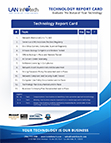Automated, self-replicating programs have been around as long as data-crunching machines have been in existence. While initially these programs were thought experiments, that changed in the early 1980s when programs intent on damaging Apple DOS 3.3 files and folders. Today, protecting against these attack vectors is a persistent and constant need for businesses and individuals.
What Is a Computer Virus?
A computer virus is a software program intended to do damage to systems and computers. ‘Computer virus’ is an umbrella term for a range of malicious software (malware). There are generally four types:
- Classic Viruses. These programs rewrite code on your device.
- Trojans. Much like the Trojan horse of history, a Trojan virus disguises itself, acting as a legitimate program, usually attached to an email file. Once activated, the Trojan virus operates often in secret on your computer, usually to steal passwords or initiate a distributed denial-of-service (DDoS) attack that overloads your system with requests, rendering it unusable.
- Worms. These viruses also infiltrate your system but unlike Trojans, they do so without your assistance. Once in your email, for example, they replicate and spread rapidly.
- Adware and Spyware. These programs record your browsing habits and either barrage your screen with advertisements (often via pop-up windows) or report that activity back to its host. In some cases, these programs can clog your hard drive with pornography or advertising that is then broadcast back onto the internet.
How Does a Computer Virus Work?
Viruses are so effective because they’re hard to detect. They can lay dormant for long periods of time before activating. They are often disguised as legitimate-looking attachments or links from familiar contacts. But when you click on a link, file or executable program, you have set in motion events that can range from annoying to disastrous.
Different virus types target different system components, including:
- Boot sector, a difficult-to-remove category often spread via removable media
- Direct action, which stay attached to files it wants to affect but do not disrupt the user experience
- Multipartite, which attack both the boot sector and executable files
- Overwrite, which destroy the data they infect
What Can a Computer Virus Do?
Once activated, the virus replicates rapidly, sometimes within a single machine and other times by spreading to other networked endpoints. They may also generate emails to your contacts that end up spreading the virus to other computers, companies and systems. It’s why many well-known viruses end up affecting hundreds or thousands of businesses.
How Can I Protect My Business from Computer Viruses?
Business network security must include automated anti-virus programs that identify and block known senders, websites and attachments. These programs need to be automatically updated to address emerging threats immediately. At LAN Infotech, we help businesses with comprehensive security assessments and solutions that protect and monitor your users and data. For a free initial consultation, contact us today.

LAN Infotech is a Microsoft Cloud Services Provider, IT Managed Support company and a leader in helping law firms, nonprofits and medical organizations deploy cloud solutions, manage computer networks, keep data protected and top technology management company. Businesses like yours need technology support to run highly-effective organizations.


